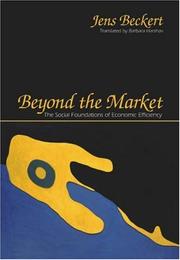| Listing 1 - 10 of 30 | << page >> |
Sort by
|
Book
ISBN: 1282825089 9786612825088 2287996656 Year: 2010 Publisher: Dordrecht : Springer,
Abstract | Keywords | Export | Availability | Bookmark
 Loading...
Loading...Choose an application
- Reference Manager
- EndNote
- RefWorks (Direct export to RefWorks)
La crise amorc e en 2007 a r v l une faille des syst mes de gestion des risques financiers et une d mesure des interventions sp culatives. L originalit de ce livre est de proposer une approche des march?'s fond e sur la distinction entre la mod lisation de l incertitude des ph nom nes conomiques et la forme des r ponses que lui opposent les agents. Les chapitres pr sentent, tape par tape, une esquisse de l histoire des rapports entre conomie et math matiques du hasard; un cadre d analyse de la consolidation des ph nom nes incertains par les agents; une approche de la logique de march dans un c
Economics -- Sociological aspects. --- Investments -- Mathematics. --- Stochastic processes. --- Uncertainty. --- Business & Economics --- Economic Theory
Book
ISBN: 0691142238 069114222X 9786612645051 1400835178 1282645056 9781400835171 9781282645059 9780691142227 9780691142234 6612645059 Year: 2010 Publisher: Princeton, NJ
Abstract | Keywords | Export | Availability | Bookmark
 Loading...
Loading...Choose an application
- Reference Manager
- EndNote
- RefWorks (Direct export to RefWorks)
The sociological study of economic activity has witnessed a significant resurgence. Recent texts have chronicled economic sociology's nineteenth-century origins while pointing to the importance of context and power in economic life, yet the field lacks a clear understanding of the role that concepts at different levels of abstraction play in its organization. Economic Sociology fills this critical gap by surveying the current state of the field while advancing a framework for further theoretical development. Alejandro Portes examines economic sociology's principal assumptions, key explanatory concepts, and selected research sites. He argues that economic activity is embedded in social and cultural relations, but also that power and the unintended consequences of rational purposive action must be factored in when seeking to explain or predict economic behavior. Drawing upon a wealth of examples, Portes identifies three strategic sites of research--the informal economy, ethnic enclaves, and transnational communities--and he eschews grand narratives in favor of mid-range theories that help us understand specific kinds of social action. The book shows how the meta-assumptions of economic sociology can be transformed, under certain conditions, into testable propositions, and puts forward a theoretical agenda aimed at moving the field out of its present impasse.
Economics - Sociological aspects. --- Economics -- Sociological aspects. --- Economics --- Sociology & Social History --- Social Change --- Social Sciences --- Sociological aspects --- Sociology. --- Sociological aspects. --- Social theory --- Economic sociology --- Socio-economics --- Socioeconomics --- Sociology of economics --- Social aspects --- Sociology --- Social sciences --- E-books
Book
ISBN: 1854181750 185418573X Year: 1998 Publisher: London : Hawksmere,
Abstract | Keywords | Export | Availability | Bookmark
 Loading...
Loading...Choose an application
- Reference Manager
- EndNote
- RefWorks (Direct export to RefWorks)
This is an accessible introduction to the theory and practice of strategic management in the public sector. It is written for new and experienced managers, undergraduate and postgraduate students of the public services. ""Strategic Management for the Public Services"": provides an understanding of the theory of strategic management; introduces ideas which guide the effective practice of strategic management in the public services (and which do not copy blindly private sector habits); gives conceptual tools and material (in the form of worksheets), which can be used to carry out analysis and pl
Book
ISBN: 1282645021 9786612645020 1400834783 0691146462 9781400834785 9780691146461 Year: 2010 Publisher: Princeton, NJ
Abstract | Keywords | Export | Availability | Bookmark
 Loading...
Loading...Choose an application
- Reference Manager
- EndNote
- RefWorks (Direct export to RefWorks)
The Company of Strangers shows us the remarkable strangeness, and fragility, of our everyday lives. This completely revised and updated edition includes a new chapter analyzing how the rise and fall of social trust explain the unsustainable boom in the global economy over the past decade and the financial crisis that succeeded it. Drawing on insights from biology, anthropology, history, psychology, and literature, Paul Seabright explores how our evolved ability of abstract reasoning has allowed institutions like money, markets, cities, and the banking system to provide the foundations of social trust that we need in our everyday lives. Even the simple acts of buying food and clothing depend on an astonishing web of interaction that spans the globe. How did humans develop the ability to trust total strangers with providing our most basic needs?
Economics - Sociological aspects. --- Economics -- Sociological aspects. --- Social capital (Sociology). --- Sociobiology. --- Strangers. --- Trust. --- Social capital (Sociology) --- Economics --- Sociobiology --- Strangers --- Trust --- Sociology & Social History --- Social Change --- Social Sciences --- Sociological aspects --- Sociological aspects. --- Trust (Psychology) --- Biologism --- Economic sociology --- Socio-economics --- Socioeconomics --- Sociology of economics --- Capital, Social (Sociology) --- Social aspects --- Attitude (Psychology) --- Emotions --- Persons --- Human biology --- Human evolution --- Psychology, Comparative --- Social evolution --- Sociology --- E-books

ISBN: 0415195683 0415195675 1134645376 1280317299 0585453535 0203455800 0429232284 1134645368 9780415195683 Year: 1999 Publisher: London Routledge
Abstract | Keywords | Export | Availability | Bookmark
 Loading...
Loading...Choose an application
- Reference Manager
- EndNote
- RefWorks (Direct export to RefWorks)
methodologieën --- sociologie --- Methodology of economics --- economie --- Economics --- Critical realism. --- Methodology. --- Philosophy. --- Sociological aspects. --- Economic sociology --- Socio-economics --- Socioeconomics --- Sociology of economics --- Social aspects --- Philosophy, Modern --- Realism --- Sociology --- Economics - Methodology. --- Economics - Philosophy. --- Economics - Sociological aspects.
Book
ISBN: 1612096468 1619422603 9781619422605 9781612096469 9781612096469 Year: 2011 Publisher: Hauppauge, N.Y.
Abstract | Keywords | Export | Availability | Bookmark
 Loading...
Loading...Choose an application
- Reference Manager
- EndNote
- RefWorks (Direct export to RefWorks)
Capitalism -- Social aspects. --- Economics -- Sociological aspects. --- Capitalism --- Economics --- Business & Economics --- Economic Theory --- Social aspects --- Sociological aspects --- Social aspects. --- Sociological aspects. --- Economic sociology --- Socio-economics --- Socioeconomics --- Sociology of economics --- Sociology

ISBN: 0521848849 0521169550 1139810324 110715314X 1107316529 1107321913 110731836X 0511522150 1107317487 1107315549 1299399606 9780521848848 9781107321915 9780511522154 9781107316522 9780521169554 Year: 2005 Publisher: Cambridge Cambridge University Press
Abstract | Keywords | Export | Availability | Bookmark
 Loading...
Loading...Choose an application
- Reference Manager
- EndNote
- RefWorks (Direct export to RefWorks)
First published in 2005, Economics and Social Interaction is a fresh attempt to overcome the traditional inability of economics to deal with interpersonal phenomena that occur within the sphere of markets and productive organizations. It makes use of traditional economic concepts for understanding interpersonal events, while venturing beyond those concepts to give a better account of personalised interactions. In contrast to other books, Economics and Social Interaction offers the reader a rigorous effort at extending economic analysis to a difficult field in a consistent manner, sensitive to insights from other behavioural and social sciences. This collection represents an important contribution to a growing research agenda in the social sciences.
Economics --- Social psychology --- Social interaction --- Sociological aspects. --- Economic aspects. --- Business, Economy and Management --- Human interaction --- Interaction, Social --- Symbolic interaction --- Exchange theory (Sociology) --- Psychology --- Economic sociology --- Socio-economics --- Socioeconomics --- Sociology of economics --- Sociology --- Social aspects --- Economics - Sociological aspects. --- Social interaction - Economic aspects. --- Sociologie économique --- Social interaction. --- Economic aspects --- Interaction sociale --- Aspect économique.

ISSN: 15661075 ISBN: 9027233012 1556197470 9027299803 9786612255168 1282255169 0585462003 9780585462004 9789027299802 9781556197475 9789027233011 Year: 2000 Volume: 4 Publisher: Amsterdam Benjamins
Abstract | Keywords | Export | Availability | Bookmark
 Loading...
Loading...Choose an application
- Reference Manager
- EndNote
- RefWorks (Direct export to RefWorks)
The widely discussed 'globalization' of economic activities has given rise to a renewed interest in the relations between such tendencies, the nature and demarcation of societies, and the nature and strategies of various actors and organizations within and cross-cutting societies. One approach to capture and express these themes has been Societal Analysis, initially developed above all to confront the internationally comparative study of work, organization, education and training, industrial relations, business and industrial structures.After twenty-five years of practising and developing Societal Analysis, this book serves to systematize and redefine the approach, and to react to criticism and newly arising issues. It brings together proponents, sympathizers and critics of Societal Analysis. It enters new fields, and contributions are clustered around the enterprise, the economy, theoretical and methodological aspects, public policy and gender issues. The message stressed and demonstrated by the editors and various authors, is that the 'societal space' of social, economic political interdependencies is not being obliterated but complexified, and therefore a topical, useful and indeed necessary explanatory framework.
Sociology of organization --- Economics --- Sociology --- Political science --- Economie politique --- Sociologie --- Science politique --- Sociological aspects. --- Study and teaching. --- Aspect sociologique --- Etude et enseignement --- Sociology & Social History --- Social Sciences --- Social Change --- Study and teaching --- Sociological aspects --- Economics - Sociological aspects --- Sociology - Study and teaching --- Political science - Study and teaching
Book
ISBN: 2735110451 2735118789 9782735110452 Year: 2004 Volume: 20 Publisher: Paris : Editions de la Maison des Sciences de l'Homme,
Abstract | Keywords | Export | Availability | Bookmark
 Loading...
Loading...Choose an application
- Reference Manager
- EndNote
- RefWorks (Direct export to RefWorks)
Illégal, clandestin, hors marché, parallèle, alternatif..., tels sont quelques-uns des termes utilisés pour qualifier les activités regroupées habituellement sous le vocable d’« économie ». Les ethnologues et les sociologues dont les contributions sont réunies dans ce volume nous entraînent dans le vif des pratiques et des configurations de ce type d’économie. Migrants, communautés Emmaus, acteurs de systèmes et réseaux d’échanges locaux, brocanteurs ou pêcheurs à pied, tous travaillent « autrement ». Il peut s’agir d’économies choisies - où l’on tente de vivre et de produire de façon alternative-, mais aussi de modes de survie dans un monde économique subi. La logique du don se mêle aux relations marchandes et utilitaristes. Elles sont à l’œuvre sous d’autres formes : échanges de savoirs et de services, mobilisation des réseaux familiaux et ethniques, réhabilitation d’hommes désocialisés au moyen de la restauration et de la vente d’objets. On y parle d’économie informelle mais les pratiques peuvent y être formalisées : création d’une nouvelle monnaie, force contractuelle de la parole donnée... Autant de situations qui font la richesse anthropologique de ce monde mouvant dont les acteurs se retrouvent paradoxalement à la fois hors marché et économie officiels et en plein dedans, inventant à leur manière des mondes sociaux et économiques différents.
Industrial sociology --- Informal sector (Economics) --- Local exchange trading systems --- Barter --- Sociologie industrielle --- Secteur informel (Economie politique) --- Systèmes d'échanges locaux --- Troc --- France --- Social conditions --- Economic conditions --- Conditions sociales --- Conditions économiques --- Systèmes d'échanges locaux --- Conditions économiques --- Economics - Sociological aspects --- France - Economic conditions - 1945 --- -France - Social conditions - 20th century --- économie souterraine --- troc --- travail --- sociologie --- Economics

ISBN: 0691049076 9786612087721 9786612935312 1282935313 128208772X 140082544X 9781400825448 9780691049076 Year: 2002 Publisher: Princeton, N.J. Princeton University Press
Abstract | Keywords | Export | Availability | Bookmark
 Loading...
Loading...Choose an application
- Reference Manager
- EndNote
- RefWorks (Direct export to RefWorks)
Beyond the Market launches a sociological investigation into economic efficiency. Prevailing economic theory, which explains efficiency using formalized rational choice models, often simplifies human behavior to the point of distortion. Jens Beckert finds such theory to be particularly weak in explaining such crucial forms of economic behavior as cooperation, innovation, and action under conditions of uncertainty--phenomena he identifies as the proper starting point for a sociology of economic action. Beckert levels an enlightened critique at neoclassical economics, arguing that understanding efficiency requires looking well beyond the market to the social, cultural, political, and cognitive factors that influence the coordination of economic action. Beckert searches social theory for the components of an alternative theory of action, one that accounts for the social embedding of economic behavior. In Durkheim and Parsons he finds especially useful approaches to cooperation; in Luhmann, a way to understand how people act under highly contingent conditions; and in Giddens, an understanding of creative action and innovation. Together, these provide building blocks for a research program that will yield a theoretically sophisticated understanding of how economic processes are coordinated and the ways that markets are embedded in social, cultural, and cognitive structures. Containing one of the most fully informed critiques of the neoclassical analysis of economic efficiency--as well as one of the most thoughtful blueprints for economic sociology--this book reclaims for sociology the study of one of the most important arenas of human action.
Economics --- Decision making --- Sociological aspects --- Social aspects --- -Decision making --- -306.34 --- Deciding --- Decision (Psychology) --- Decision analysis --- Decision processes --- Making decisions --- Management --- Management decisions --- Choice (Psychology) --- Problem solving --- Economic theory --- Political economy --- Social sciences --- Economic man --- Social aspects. --- Sociological aspects. --- Economic sociology --- Socio-economics --- Socioeconomics --- Sociology of economics --- Sociology --- Economic order --- Economics - Sociological aspects --- Decision making - Social aspects
| Listing 1 - 10 of 30 | << page >> |
Sort by
|

 Search
Search Feedback
Feedback About UniCat
About UniCat  Help
Help News
News